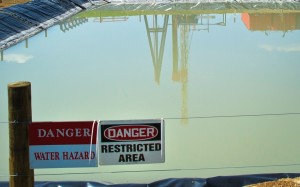Studies released over the past few months have linked pollution from natural gas extraction with birth defects.
In a study released in January by Environmental Health Perspectives, researchers examined data from 124,842 births between 1996 and 2009 in rural Colorado. They examined correlations between how close and dense natural gas development was to the pregnant mother and incidences of various birth defects, including congenital heart defects, neural tube defects, oral cleft, preterm birth and low term birth weight.
The study found that the most exposed mothers, who lived in areas containing over 125 natural gas wells per mile, were 30% more likely to have a child born with a congenital heart defect than a mother who does not live near any wells. One might ask – how is this possible?
Many pollutants from the natural gas extraction processes, including toluene, xylenes and benzene, are suspected to cause physiological abnormalities and mutations in human DNA. These pollutants are known to be able to cross the placenta blood barrier, raising the possibility of fetal exposure to these and other air pollutants.
Of course, air pollutants are not the only danger posed by natural gas extraction. The fluid used in this process is already known to contain over a hundred known or suspected endocrine disruptors – chemicals that can interfere with the body’s responses to estrogen and testosterone – which can lead to many health problems including infertility and cancer. What researches found in a late 2013 study was that groundwater samples taken from areas around natural gas extraction contained very high levels of these endocrine disruptors, while groundwater taken from an area without natural gas had much lower levels. In other words, natural gas extraction is linked with the contamination of groundwater with chemicals that cause infertility.
While researchers cannot say that their studies definitively prove that the natural gas extraction process causes birth defects or groundwater contamination, it is clear that more research needs to be done and the process needs to be further regulated before America continues on an ‘All of the Above’ energy policy. These studies suggest that the future health of generations to come depends on it.


 The EPA in the last day or so has assumed the dreaded playground title of “taker backer”. Tuesday, Lisa Jackson announced that they would be putting a moratorium on all mountain top removal mining permits, which could delay 150-200 surface coal mines. Yay for the environment right? Well, not so fast. Later that day the announcement was made that they weren’t actually putting any type of hold on mining permits, and that they were simply reviewing two of them.
The EPA in the last day or so has assumed the dreaded playground title of “taker backer”. Tuesday, Lisa Jackson announced that they would be putting a moratorium on all mountain top removal mining permits, which could delay 150-200 surface coal mines. Yay for the environment right? Well, not so fast. Later that day the announcement was made that they weren’t actually putting any type of hold on mining permits, and that they were simply reviewing two of them.


